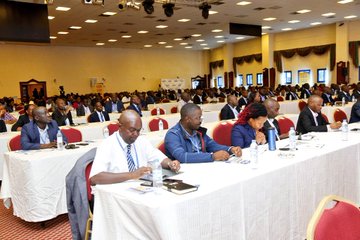Minister of State for General Duties, Hon Henry Musasizi, on Tuesday, officiated the three-day First Public Financial Management conference taking place at Imperial Resort Beach Hotel, Entebbe and online.
The conference is organised by the Institute of Certified Public Accountants of Uganda (ICPAU) and is running from 18 – 20 April 2023.
At the conference, stakeholders are sharing knowledge and ideas on strengthening Public Finance Management (PFM) sustainably and accountable use of public resources.
“The automation of PFM systems has enabled the government to prepare more accurate and timely financial information which directly contributes to improvements in accountability, transparency and combating corruption,” said Musasizi.

He extended his gratitude to ICPAU for bringing together accountants, auditors, civil society organizations and other stakeholders in Uganda to share ideas on Public Finance Management in the public sector in his opening remarks.
“There is no room for impostors,” he said while thanking the institute for making an effort to weed out impostors from the market, especially auditors.
The minister urged stakeholders to ensure the value for money, accountability, combating corruption and proper use of resources.
He said the economy remained resilient and is steadily recovering. “It is expected to grow at 6% in 2023-24. The annual inflation eased to 9% in March 2023.”

CPA Derick Nkajja, Chief Executive Officer at ICPAU, in his welcome remarks, said the role of accountants in the public sector is to carry out integrity and determination to achieve great public finance management.
CPA Constant Othieno Mayende, ICPAU President, in his official address, commended Ugandans for having a keen interest in public financial management matters as the PFM Conference has registered 700 participants attending online and in-person.
He said PFM is the backbone of national development.

“The world’s fastest-growing economies have placed PRM at the forefront with substantial investments in education, health and information communications technology infrastructure, to improve the management of information, foster integration systems, enhance transparency and eliminate fraud,” he said.
He commended the government for the efforts in PFM space and efforts towards professionalising the cadre accounting staff.
He recommended that budget allocations are enhanced to improve the infrastructure that drives the three drivers of PFM; education, health and ICT.
Patrick Ocaliap, Deputy Secretary to the Treasury, in his keynote address, stated that Uganda’s Public finance Management has come a long way and there are various PFM Reforms drivers for example independent assessments and reports by overseeing authorities like Auditor General’s office.

The Accountant General, CPA Lawrence Semakula, highlighted the challenges impeding Uganda from full International Public Sector Accounting Standards (IPSAS) implementation and how to overcome them.
“Ugandan government recognized that a sound PFM system provides the foundation for effective management of public resources, delivery of public services in a cost-effective and sustainable manner, and achievement of development outcomes,” CPA Semakula said.
According to CPA Semakula, 28 of the 49 jurisdictions that reported on accrual in 2020 are using IPSAS in different ways: 4 adopted IPSAS with no modifications; 8 modified IPSAS for the local context; and 16 used IPSAS to develop their own national standards.
He cited some of the benefits of Accrual Accounting including improved planning and decision-making, greater levels of fiscal transparency and accountability, long-term fiscal sustainability and improved financial management.

He explained that the approaches for transitioning to accrual-based accounting are either big-bang or phased implementation approaches.
“The Big Bang approach entails requiring all the government entities under the scope to adopt all of the IPSAS requirements and publish audited accounts while the phased approach is one where IPSASs are adopted and implemented in stages depending on institutional capacity,” he noted.
He said the Government of Uganda’s implementation plan for the transition to accrual basis IPSAS comprises of three main phases: gap analysis and development of the implementation action; conversion – implementation of the transition road map; embedding and sustaining.

The conference targets accounting officers, policymakers, planners, economists, auditors, accounting and finance professionals, development partners, civil society actors, Members of Parliament, PFM Consultants and members of the public.
Organised under the theme, Strengthening the Public Finance Management for Sustainable Development, the conference seeks to bring together public sector players to share experiences and re-empower each other to tackle the challenges affecting the optimal utilisation of public resources.
The public sector is a nation’s vehicle for service delivery.

Public goods such as transport infrastructure, energy infrastructure, healthcare, security, utility services, and education, among others, are better provided by the government.
However, Uganda’s public sector continues to be marred by accountability scandals. Despite the introduction of PFM reforms, and the efforts of the Parliamentary accountability committees to hold public officials answerable for public expenditure, the scandals rage on.












